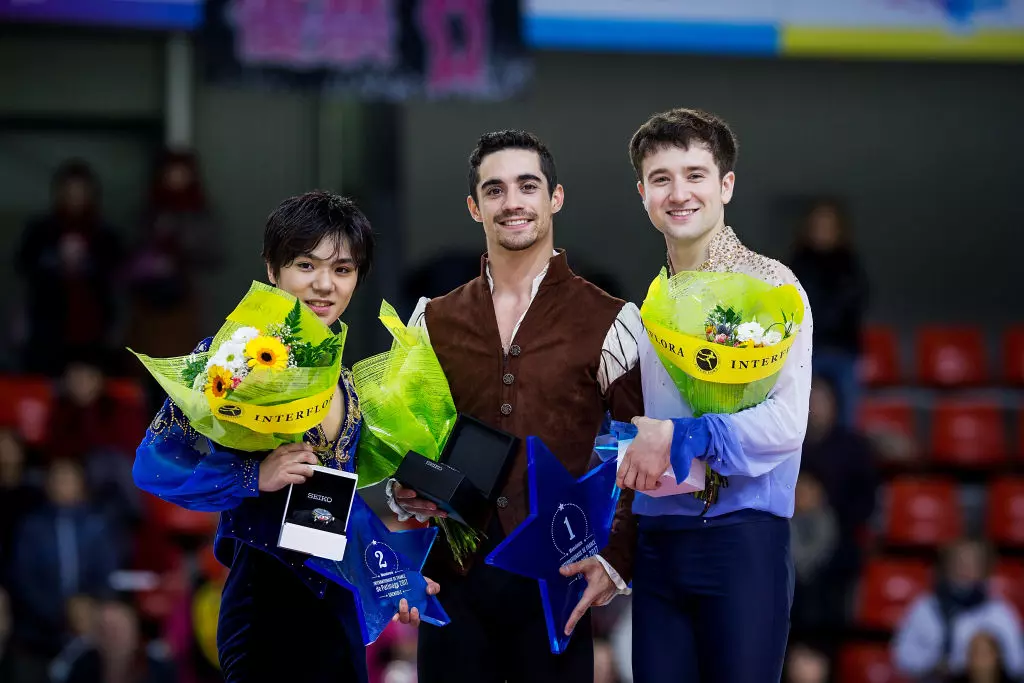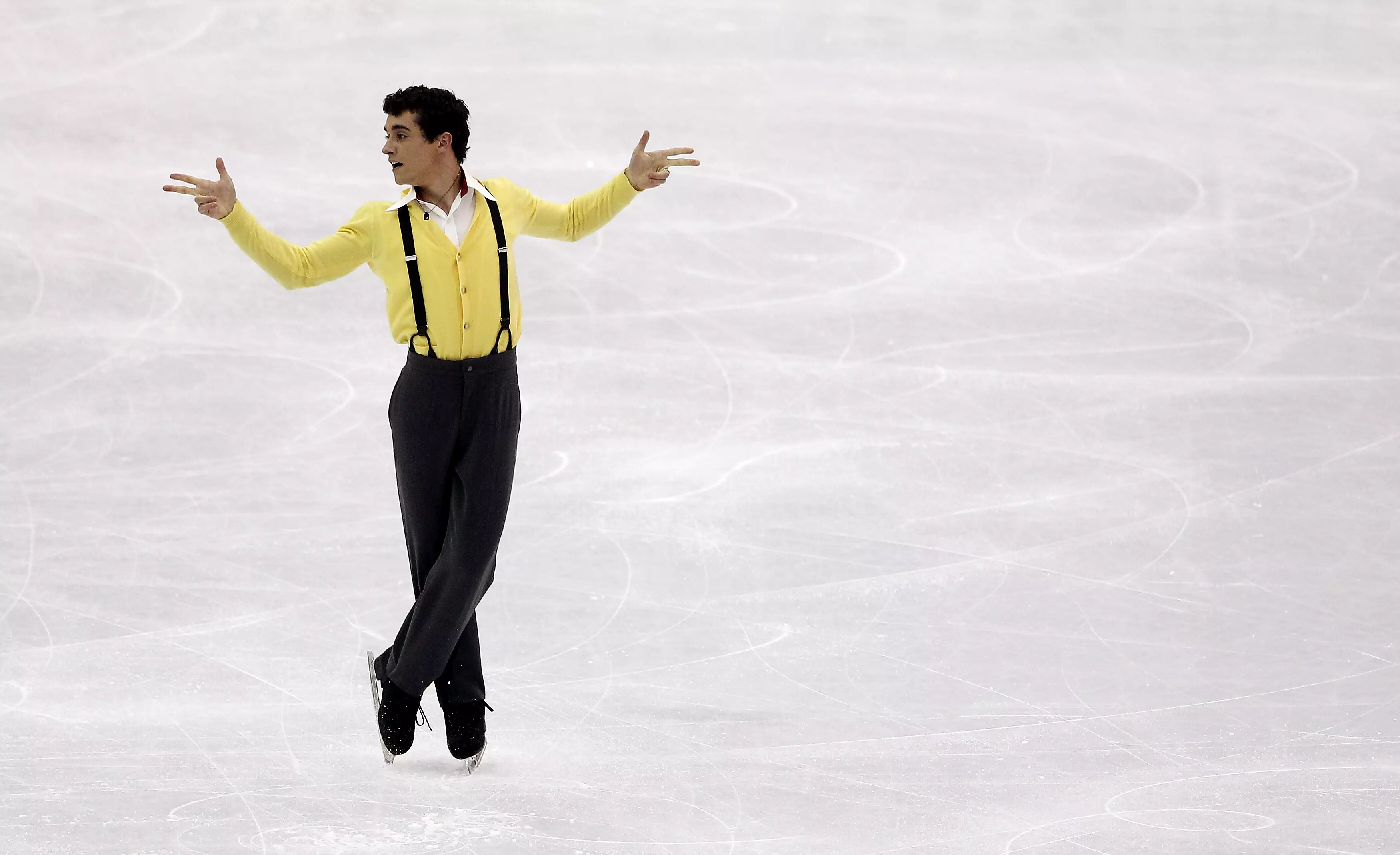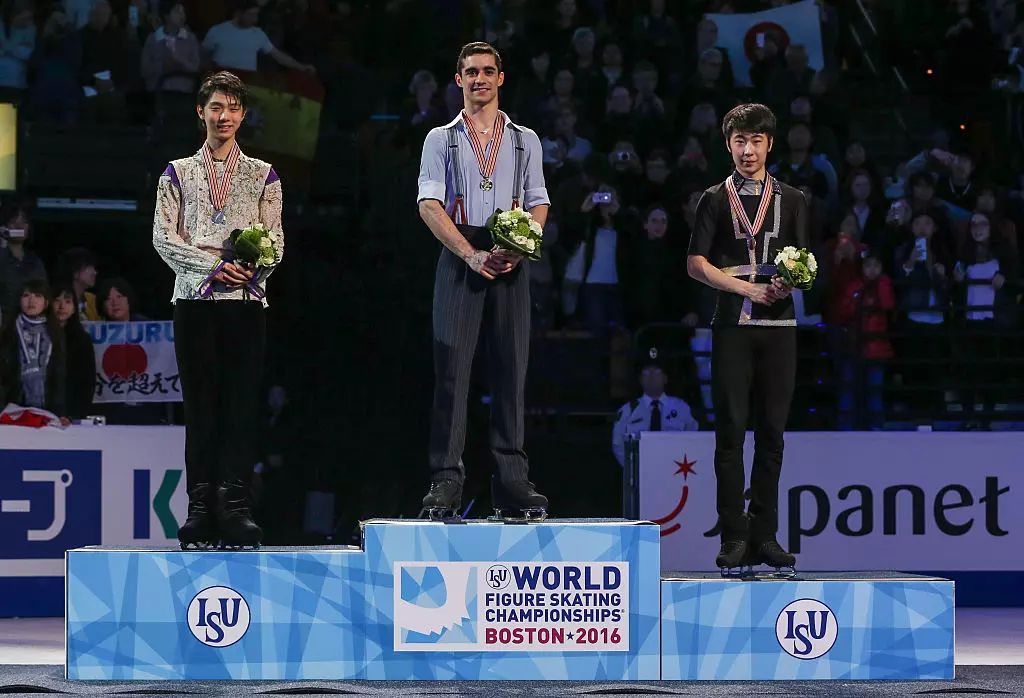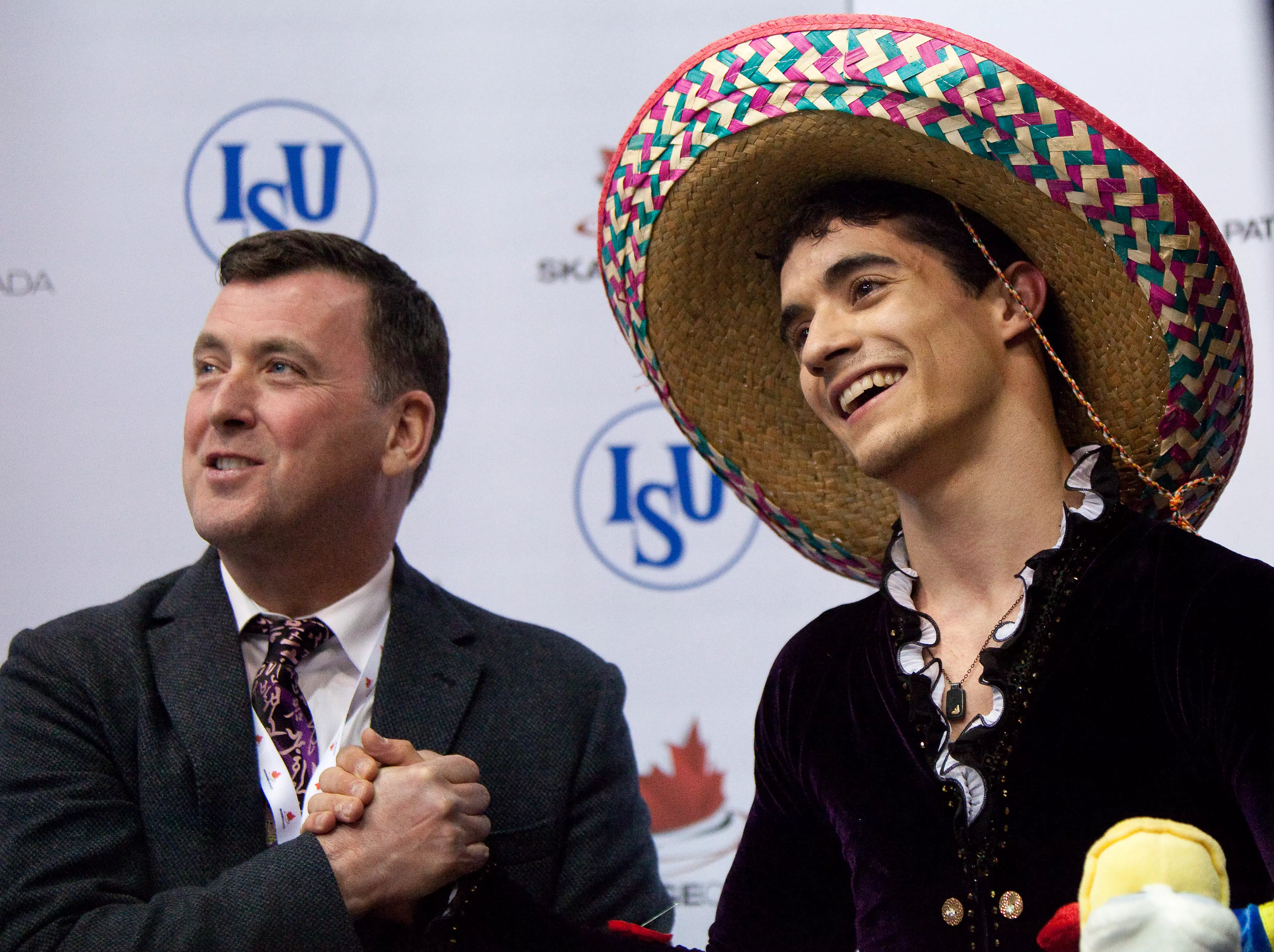J: Javier Fernandez; Q: Interviewer Tatjana Flade for ISU
Javier Fernandez, 26, made history by becoming the first Spanish figure skater to win medals at the ISU Grand Prix, European and World Championships. He is a five-time European Champion and a two-time World Champion.
Q: The Internationaux de France de Patinage in Grenoble might have been your very last Grand Prix, how do you feel about that?
J: We were talking about it with the skaters and it’s quite unbelievable how many years we have been skating; how many competitions I’ve done; and it seems like this is the year that it might be the last competition that I am going to do and I don’t even believe it. I did this competition and then I thought: ‘Maybe this is going to be my last Grand Prix’. It’s strange, so strange.

Q: This was your 7th Grand Prix gold medal.
J: I heard. I saw it on the ISU page (laughs). I didn’t know. It’s also quite impressive the big career that I’ve had. When you see the results and you see the achievements that you’ve had you realize how much you’ve got.
Q: Looking back, how does it feel to have accomplished so much?
J: I didn’t know what was going to happen with figure skating. I just did it for fun when I was a kid. Now when I see all of my career, all the year by year improvement, you can see and realize - if you put effort into something and you really want to do it and, of course, if you’ve got help around you, then things can turn into something that is not impossible. I don’t know what to say.
Q: Do you get emotional about finishing your competitive career?
J: It’s kind of sad at the same time. My energy is kind of going away already. I want to do it sometimes and I don’t have the same energy as maybe other skaters can have if you are younger or haven’t been in senior skating at a high level for so long. I’ve been here, it seems like forever: 2007 in seniors; before I did juniors. But to see how much I’ve accomplished in these many years is unbelievable. I am happy that also, if this was my last Grand Prix, I was able to win it. Maybe not with the best performance but it is a real goodbye to the Grand Prix and I am glad I was able to get the title.
Q: The Grand Prix Final gold medal is one of the titles you are missing. What was the disappointment like after the Audi Cup of China?
J: If you think, in general, about this season, it is better to make a mistake at the Grand Prix Final or even the Grand Prix, because we’ve got Europeans, we’ve got Olympics, we’ve got Worlds and, if I have to choose a stage where I needed to make a big mistake, then I have to choose a Grand Prix or a senior B. Of course we don’t want to choose and we always want to skate good. But I’m glad that we had it and we did a bad competition to learn from it and build from it because this season is going to be long, it’s going to be hard and it’s going to be important.
Q: You were 6th in China and you can’t say you weren’t prepared for the competition but you say you want to learn from it. What did you take away from the experience?
J: Even when you train in the best conditions and you’ve been having amazing practices with great short and free programs in practice, competition is so different. It is a different world, practice and competition, I always say that. I need to learn that even if I am having great practices, competition is going to be a totally different feeling. Practice is important but we need to transfer that into the competitions and make a program that shows off that you have been training great instead of training great and then not do a great program.
Q: Especially in the short in France you have proved that you are highly competitive still.
J: Yeah, the short program here, it was great. There were no mistakes. So I was glad that we erased what happened in China and transferred that into the great short program that we did here. We just have to keep training and keep improving to do it also in the free program. But, of course, it’s more difficult and the day is longer. Competitions are never easy but sometimes they are easier than others.
Q: You have also some advantages compared to the younger skaters.
J: Yeah, of course the experience that I have or even the titles. But, at the end of the day it is one competition, in the Europeans or the Olympics or the Worlds, the experience doesn’t matter, the titles you have don’t matter. It is at that point, at that moment, at that competition that it makes one champion or the other champion. Because I know how I used to be before and how much energy I put into the practices and how much it cost me to do a free program run-through. Now it’s different because I’m not 20 anymore. I saw the difference of the age every year. So that’s why I say I am running out of energy because I can feel it. It’s harder to do programs. It’s harder to keep everything more consistent. That is why I say: “Why am I going to try new quads? It’s harder to keep everything consistent so let’s work on that! Why am I going to work on quad loop?” That was the reason. I can do the quad loop but if I do the quad loop but then I fall 4 times …. You know it doesn’t work that way.
Q: You have mentioned your achievements and that you still have Europeans, Olympics and Worlds to come. What is it that keeps you going?
J: A lot of things. Even when I say that I am already running out of energy, that’s because I feel it. I feel like I have got to the point where it’s hard to catch up with other skaters and I just have to play myself smart. You know, I cannot last for another 4 years: I am not going to be able to do it. We also have to be smart, we the athletes, and know when to step away. So, in general, what I think I have to do is keep myself concentrated on what I have to do in the competitions and then….. Let’s just say: ‘I am ready for the next step and ready for whatever comes later after competitions and training’. A lot of things keep me going: I like my schedule; I like my training; I like to meet the different people and the skaters and, of course, competitions are hard. You get nervous and nobody likes to get nervous and nobody like to do a bad job. But then, when you do a good job and you do a good competition then the happiness that we get inside for all the work that we have been doing for the competition: that’s the most important thing. That is the priceless thing that we get. So that feeling also keeps us going.
Q: At the European Championships, you will go for your sixth title.
J: That would definitely be a big achievement. That’s why the Europeans is a really important competition because I also want to keep doing the little goals that I can still reach and that’s a really big one. To keep making history, also in figure skating history, I think is really important and special for me. So, I am definitely going to try to make it happen.
Q: If you think about your career in general, what is your favorite program?
J: I’ve got a lot of them actually. I can mention ‘Pirates of the Caribbean’. It was one of my first programs where I start being a little known and people started recognizing me a little bit. Then l like a lot ‘Charlie Chaplin’. I like a lot ‘I Love Paris’. That was a program that, every time I watched the video, I’m actually like: ‘I like how I skate’. That’s strange isn’t it? When you do something and you watch yourself you are like: ‘Uh-uh’. I like the ‘Frank Sinatra’ program, it was great. ‘Black Betty’, ‘Flamenco’, I’ve got a lot of them.

Q: You have explored many different styles.
J: Exactly. That is the reason, I think, why I like so many because I got into so many characters that it’s hard to give that away.
Q: You said that ‘Charlie Chaplin’ was one of your favorite programs, is that the reason why you decided to do a Charlie Chaplin short program this season?
J: It was one of the reasons, because we liked it so much, but we wanted to bring a different Charlie Chaplin. Something that the people would probably not recognize or remember so well as the other one but also to show the people that, even if you do the same character, you can switch around a little bit the style. It’s not like you are doing the same thing – you are taking music that is from the same actor or character but you do a different program.
Q: In China you said, after the short program, at the press conference that you felt like the judges didn’t like the program.
J: That was a big mistake. That was my mistake because I didn’t see the PDF’s and I saw the scores and I thought the scores are so low. Of course it was low, but I was a little bit mad and when I said that at the press conference and then afterwards I saw the PDF’s I thought: “Oh my God! What did I say? Why did I say that?”. My component scores were good but my technical was not because I did not do a good program.
Q: For your free program you are skating to music from ‘Man of La Mancha’. How important is it for you to skate to something that represents your culture at the Olympic Games?
J: In my country not so many people know about figure skating and so I wanted to give them a little Spanish touch so that they are going to appreciate it more. Also, for me it is a program that I really like, it’s a character that I like to interpret. But, I think, the main idea is for the Olympics why not do something that is connected to my own country because a lot of people are going to be watching the TV to see what will happen. You never know, but it’s worth it to give it a good try to the new stuff.
Q: Do you feel close to the character of Don Quixote? He is somebody who had to fight for something and you had to come a long way, too.
J: Yeah, I had to fight my way through sometimes and, of course, it wasn’t easy. He also fell in love with this girl: I also did. It is true, the history of Don Quixote is actually pretty amazing and it is really weird but amazing. He got the person that he helped save all the time. He is fighting his own mind fights – things that are not even true but he thinks they are real – and you can take that into something to learn: everybody has their own fight in their mind and, of course, I do. It’s a character to learn and a character who is interesting to see, read and interpret.
Q: You are heading into your third Olympic Games. What did you learn from your previous two Olympic Games in 2010 and 2014?
J: My first Olympic Games in Vancouver were an experience. I was young. I knew I didn’t have a chance to be in the top 5 or top 10. So I just took it like an experience. Something to learn, to be at an Olympics with all the Olympians and athletes. It was a great experience. I learned a lot from it because it was the first time I was around that many incredible athletes from all around the World, from all sports and it was impressive. My second Olympics in Sochi, my mind was different. I wanted to get onto the podium but it didn’t happen. I didn’t have a bad competition but it was not good enough. I still remember I had one little mistake, one triple Sal too many, and then Denis Ten beat me. But that’s sport, that’s competition and that’s the way it is. We learn from it and keep working. So I think that kept me going even harder for practices. Because I remember when I got back on the ice right after Olympics I had so much energy to give in practice that I never had before. So, I think, it was actually positive for me to not even achieve the medal in Sochi.

Q: How does your family support you?
J: I do not come from a really wealthy family. But they have always supported me from the beginning. Me and my sister (Laura) – we were both skaters when we were young. They supported us a lot since we were really young. It is a long story and I wrote in my book about it. My Dad had to work extra time to be able to pay for our skating lives. Then, when I left Spain and I started to go somewhere else for training – not everyone can pay that. My Dad is in the military and my Mum is Post Officer. My sister had to quit skating for my parents to be able to pay for my skating. So my family has been supporting me all the way through, even giving their own time or things they like to do to make me the skater that I am right now.
Q: When you moved abroad at the age of 17, what was the discussion you had with your parents?
J: First of all, I needed to decide myself whether to go or not. When I first had the meeting with Nikolai Morozov about going he asked me: ‘You need to answer me if you really want to come and you need to answer me right now’. So, I was 17 years old and was like: ‘Oh my God!’. I didn’t even know the other skaters and how good they were and Nikolai. But everybody was like: ‘They are amazing. They are so good – the best of the best!’. So I said: ‘Yes! Of course! I’m going, I’m going!’. Then I had to talk to my parents, because that kind of opportunity, when I was 17 years old – I was not that good of a skater – and then somebody saw me and they said: ‘This guy has potential’. So I needed to take that opportunity and my parents also supported me in that decision. They said: ‘We will try to help you as much as we can. We’ve got to be smart because we don’t have so much money to support you. But go ahead! Try it out and work hard!’. And I left.
Q: Will your parents come to the Olympics to watch?
J: Yes. They will come to Europeans and the Olympics.
Q: Do they usually come to competitions?
J: They do come, but not to all of them. They put up a budget and they say: ‘This is the competition we are going to do and how much it’s going to cost’. I have told them: ‘I will pay for you’ but they are like: ‘No!’.
Q: How do you feel when your parents and, perhaps, your sister are coming and watching you?
J: It’s great! It’s great to see them around the competition and to be able to skate great when they are there – it’s a great feeling. And then, of course, celebrating with them after the competition is done. It’s just a different atmosphere that you have when your family is around.
Q: Some skaters don’t like it so much. They feel it is more pressure, but apparently it is not like that for you?
J: No, I don’t think like that because my parents have been coming to watch my competitions so many times and they never pushed me to do anything or to do anything better. They trust the coach. They say: ‘Your coach is your coach. We are not your coach. We are just here to support you in the good and in the bad’.
Q: You have been with your coach Brian Orser for quite some time now. What would you say is the most important lesson you have learned from him?
J: He always says: ‘Stick to your plan! Make your plan and go with it! It doesn’t matter if you do a bad competition or a good competition – always follow your plan!’. He’s got a great team with Tracy (Wilson) at the Cricket Club and there’s David Wilson. He really knows how to make a skater a good skater. And I’ve learned a lot because I also learned how to really work into the ice and how to do many run-throughs a week and not complain. It’s the way of learning: your training; your career and what you want to get. I think they are good at teaching me that. If you don’t have it, they will explain it to you until you get it. The best way is when you start doing it and then you can see the results and you are like: ‘Oh my God they were right!’.

Q: How big is the impact that you have had in Spain for skating?
J: In the last three years we had a big impact. A lot of people started following figure skating. We’ve got many more ice rinks that have been built in the country. We have got more support, more sponsors, more everything. Now people know about figure skating a little bit more. They know that we have a team that is competing. Outside they start recognizing me, they start following me and following the other skaters. So we did something perfect.
Q: What is your advice to the next generation of figure skaters?
J: The problem with athletes is that they always want to be the best and when you want to be the best you will try whatever to be the best. So I don’t think it even takes in the skaters, I think it takes more in the rules. Skating has changed so much in a little time that, at some point, there are going to have to be new rules until you can see that there aren’t going to be triples anymore, I don’t know. I leave that to the smart people to decide how is the best way to change that. We hear every day, you see a competition and everybody is falling around because everyone is trying to push to the limits. Maybe I don’t do as many quads as Shoma (Uno) or as Yuzu (Hanyu) or as Boyang (Jin) or Nathan (Chen) but I am trying to push my skating to the limit then my quads are going to be harder to do. That’s the big question: is it going to be the skaters that realize it or does the ISU need to make a rule that says only three quads in the free program? Now that’s going to be the real fight where the best skater, the best jumper, the best spinner, the best everything is going to be, even if all programs are clean, one of them is going to be the champion because he is the best at everything. That will be one thing. I don’t know – it’s hard to know. I say it as a skater, but there are so many things involved that we probably don’t even know, but we will see.
Q: What is your plan when you retire from competing?
J: I’ve got a lot of plans in my head. But what it comes to first: I still don’t know. Long term, I want to be a coach but also I want to do big shows for a while. If I am able to keep doing shows I am going to try to keep skating because I like it. It’s a different kind of skating that the skaters enjoy a lot because it’s more playful and more enjoyable and it’s a better connection with the fans. I’ve already got a society that is open in Spain. Last year, at Christmas, we did a show and we want to keep that going. Also we want to do summer camps around the world not only nationally. So I’ve got a lot of plans, now I just have to make them happen.
Q: Thank you very much for the interview and all the best for you.